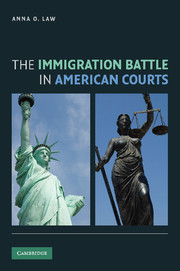Book contents
- Frontmatter
- Contents
- List of Tables and Figures
- Acknowledgments
- 1 Introduction
- 2 How Do We Know What We Know? Data, Methods, and Initial Findings
- 3 The Rise of Two Courts with Differentiated Functions
- 4 Interstitial Policy Making in the U.S. Courts of Appeals
- 5 Institutional Growth and Innovation: The Ninth Circuit Court of Appeals and Immigration
- 6 Continuity Amid Change: The Federal Courts' Commitment to Due Process
- 7 Conclusion
- Appendix A Further Elaboration of Case Selection Methods
- Appendix B Further Elaboration on the Search for Modes of Legal Reasoning
- Appendix C Numerical Codes for Modes of Legal Reasoning
- Appendix D Interview Questions
- Index
Appendix C - Numerical Codes for Modes of Legal Reasoning
Published online by Cambridge University Press: 04 August 2010
- Frontmatter
- Contents
- List of Tables and Figures
- Acknowledgments
- 1 Introduction
- 2 How Do We Know What We Know? Data, Methods, and Initial Findings
- 3 The Rise of Two Courts with Differentiated Functions
- 4 Interstitial Policy Making in the U.S. Courts of Appeals
- 5 Institutional Growth and Innovation: The Ninth Circuit Court of Appeals and Immigration
- 6 Continuity Amid Change: The Federal Courts' Commitment to Due Process
- 7 Conclusion
- Appendix A Further Elaboration of Case Selection Methods
- Appendix B Further Elaboration on the Search for Modes of Legal Reasoning
- Appendix C Numerical Codes for Modes of Legal Reasoning
- Appendix D Interview Questions
- Index
Summary
0 Stat Interp A Striving for a sensible construction of statute so as not to reach an absurd result.
1 Stat Interp B Congress would have been explicit if they wanted to deny these rights.
2 Stat Interp C Determining the meaning of the statute by textual analysis or deduction.
3 Plenary Power It is not for the courts to make changes to policy, Congress has control over this area of law.
4 Proc Due Process The lower court or administrative agency official made an error.
5 Doctrine Citing of legal doctrine and case law.
6 Administrative Discretion Deference to the admin agency (usually the BIA) and the court will only overturn if there was not enough substantial evidence supporting the BIA's determination.
7 Reasonable Decision was reasonable and supported by substantial evidence.
8 Evidence Decided the case based on facts and evidence.
9 Fong Haw Tan Standard from the case Fong Haw Tan v. Phelan, 333 U.S. 6 (1948): “deportation is an extreme measure; we should take care before we deport someone.”
10 National Sovereignty The regulation of a nation's borders, including the determination of which aliens may enter and remain in the United States, is one of any sovereign nation's prerogatives.
11 Harmony of Construction Whenever possible, we should read statutes as not being in conflict with treaties.
12 Foreign Policy Immigration is closely related to Congress's foreign policy functions.
- Type
- Chapter
- Information
- The Immigration Battle in American Courts , pp. 245 - 246Publisher: Cambridge University PressPrint publication year: 2010



